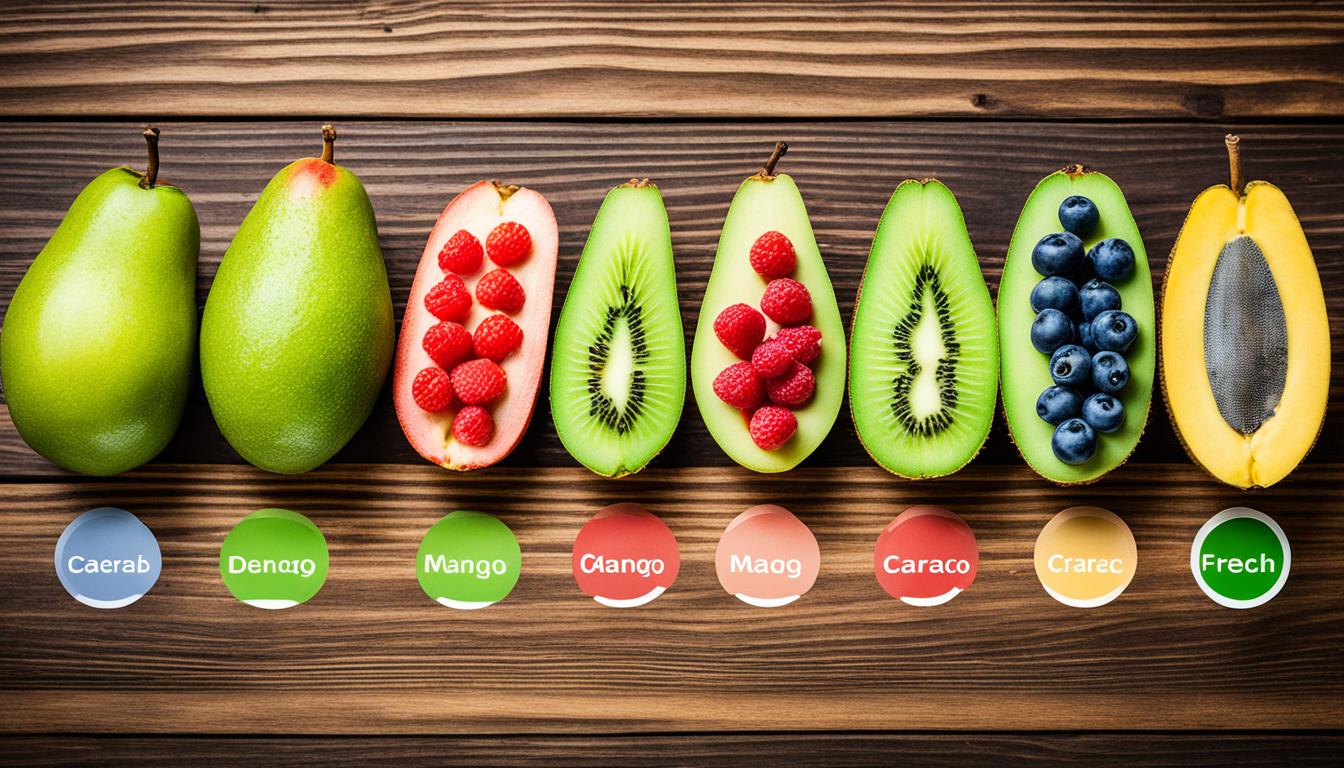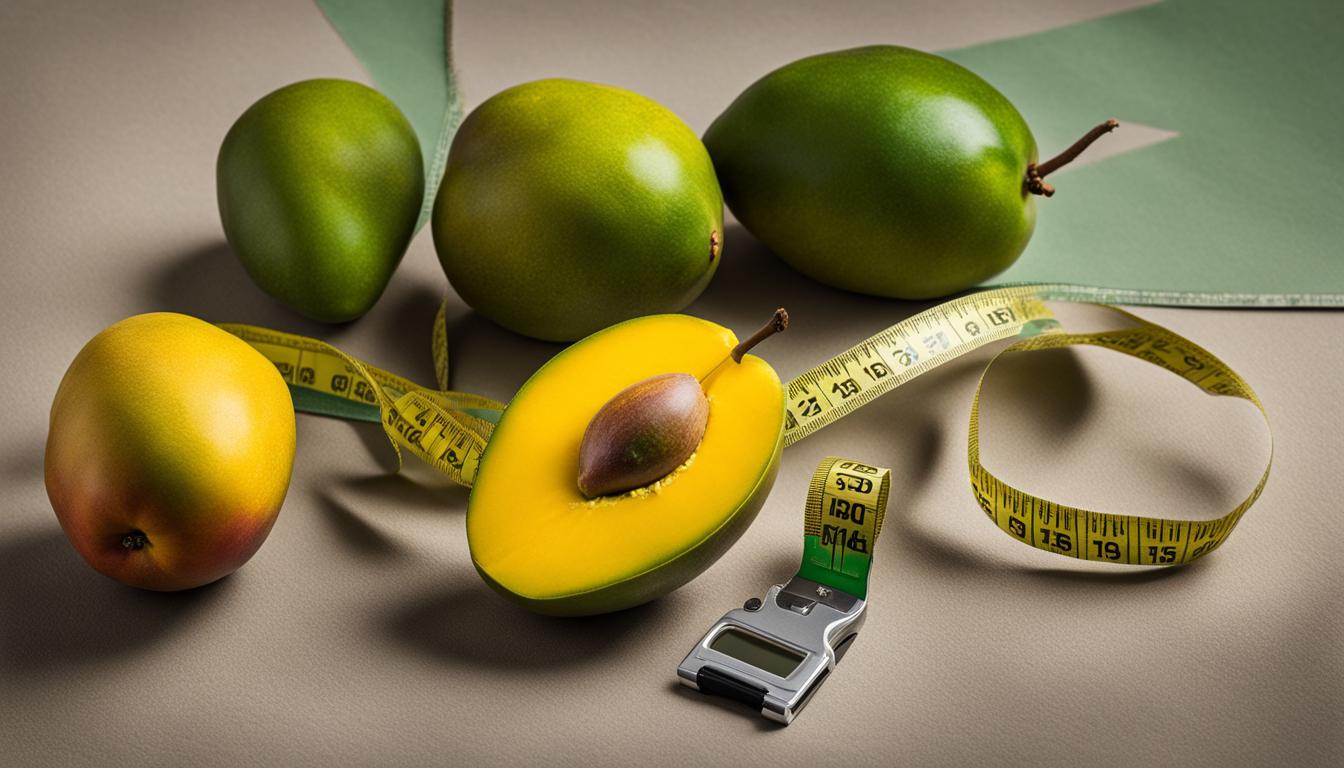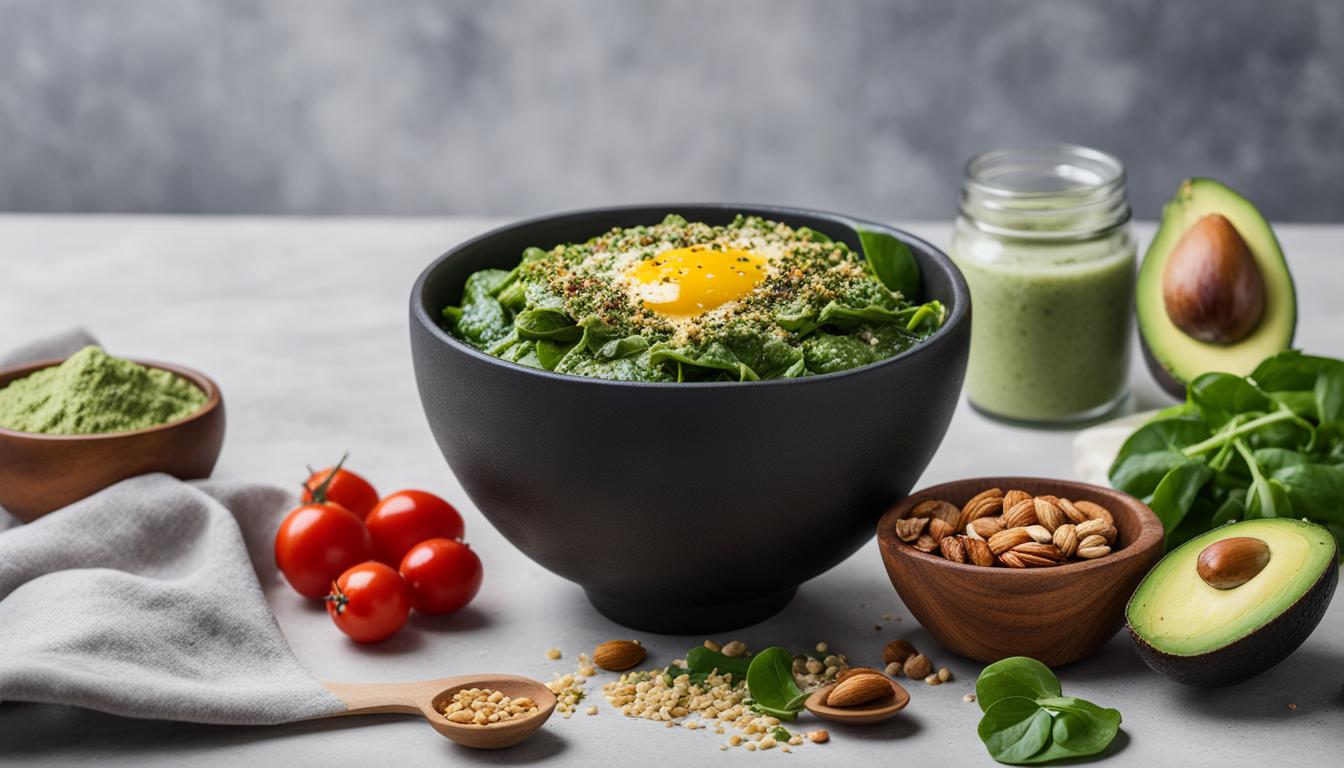If you’re following a keto diet, you may be wondering if mangoes are a suitable fruit option. The keto diet is known for its low-carb approach, which can be challenging when it comes to fruit consumption. In this article, we’ll explore whether mangoes fit into a keto-friendly diet and provide you with some alternatives to consider.
Mangoes are undoubtedly delicious, but they are slightly higher in carbs compared to other fruits. A cup of diced mango contains approximately 25 grams of carbs. While this may seem high for a low-carb diet, it’s important to consider the net carbs, which deduct the fiber content. In the case of mangoes, one cup of diced mango has around 22.4 grams of net carbs.
Although mangoes may not be suitable for strict keto diets that require very low carb intake, they can still be enjoyed in moderation as part of a low-carb or moderate-carb diet. They are packed with important vitamins and minerals, making them a nutritious choice.
Key Takeaways:
- Mangoes have a higher carb content compared to other fruits.
- Net carbs in mangoes, after deducting fiber, amount to approximately 22.4 grams per cup.
- Mangoes can be enjoyed in moderation as part of a low-carb or moderate-carb diet.
- Consider balancing the carb intake from mangoes with other low-carb foods.
- There are alternative keto-friendly fruit options with lower carb content to consider.
Ranking Fruits Based on Carb Content
When it comes to following a low-carb or keto diet, choosing the right fruits can make a big difference. Let’s take a look at how various fruits rank based on their carb content.
Here is a table showing the carb content of some popular fruits:
| Fruit | Carb Content per 100 grams |
|---|---|
| Watermelon | 8 grams |
| Strawberries | 8 grams (per cup) |
| Cantaloupe | 8 grams |
| Peaches | 10 grams |
As you can see, these fruits are considered low in carbs compared to mangoes. Watermelon, strawberries, cantaloupe, and peaches all have fewer carbs per 100 grams than mangoes, making them better options for those following a low-carb or keto diet.
It’s important to note that serving size also plays a role in carb intake. For example, while strawberries have 8 grams of carbs per cup, the carb content per 100 grams may be different. When choosing fruits for your diet, consider both the serving size and carb content to make the best choices.
Now that you have a better understanding of the carb content in various fruits, you can make informed decisions when selecting fruits for your low-carb or keto lifestyle.

A Quote:
“Choosing low-carb fruits can help you enjoy the sweetness of fruit while keeping your carb intake in check.” – Nutritionist Sarah Johnson
Balancing Mangoes in a Keto Diet
While mangoes may not be the best choice for those following a strict keto diet, they can still be incorporated in moderation. It’s important to balance the carb intake from mangoes with other low-carb foods in the diet. For example, adding a small amount of diced mango to a salad, a smoothie, or a homemade salsa can provide a burst of natural sweetness without significantly impacting ketosis.
It’s also important to consider portion sizes and individual carb limits when including mangoes in a keto diet. One serving of diced mango (about 1 cup) contains approximately 22.4 grams of net carbs, so it’s essential to incorporate it mindfully while staying within your daily carb limit.
However, if you’re looking for alternative keto-friendly fruit options, there are plenty to choose from. Avocados, for instance, are an excellent choice as they are low in carbs and high in healthy fats. Berries, such as strawberries, raspberries, and blackberries, are also low in carbs and packed with fiber and antioxidants. Lemons and limes add a refreshing citrus flavor without adding many carbs, making them a suitable addition to drinks or recipes. These alternatives can provide similar health benefits to mangoes while keeping your carb intake in check.
Adding a small amount of diced mango to a salad, a smoothie, or a homemade salsa can provide a burst of natural sweetness without significantly impacting ketosis.
Benefits of Balancing Mangoes in a Keto Diet
While mangoes may have slightly higher carb content compared to other fruits, they still offer several potential health benefits. Mangoes are rich in vitamins, minerals, and antioxidants.
Mangoes are particularly high in vitamin A, which plays a crucial role in maintaining healthy skin and supporting healthy aging. They also contain vitamin C, which helps boost the immune system.
Incorporating mangoes in moderation, along with other keto-friendly fruits and low-carb foods, can provide a well-rounded diet that includes the essential nutrients needed for overall health and well-being.
Carb Content Comparison of Mangoes and Other Keto-Friendly Fruits
| Fruit | Carbs per 100g |
|---|---|
| Mango | 25g |
| Watermelon | 8g |
| Strawberries | 8g per cup |
| Cantaloupe | 8g |
| Peaches | 10g |

As seen in the table above, mangoes have a higher carb content compared to other keto-friendly fruits like watermelon, strawberries, cantaloupe, and peaches. This is a key consideration when incorporating mangoes into a keto diet.
However, it’s essential to note that every person’s carb tolerance may vary. Some individuals may be able to include mangoes in limited quantities without hampering their ketosis, while others may need to be more cautious. The key is to find a balance that works for your specific dietary needs and goals.
Remember, the key to success in a keto diet is to maintain a state of ketosis by keeping your carb intake low. Balancing mangoes with other low-carb foods and understanding your personal carb limits can help you enjoy the nutritional benefits of mangoes while staying on track with your keto journey.
Potential Health Benefits of Mangoes
Despite their higher carb content, mangoes offer several potential health benefits. They are rich in vitamins, minerals, and antioxidants. Mangoes are a good source of vitamin A, which promotes healthy skin and supports healthy aging. They also provide vitamin C, which helps boost the immune system. Additionally, mangoes contain dietary fiber, which supports digestive health.
While mangoes may not be ideal for strict ketogenic diets, their nutritional content can still contribute to a well-rounded diet.
| Nutrient | Amount per cup (165g) |
|---|---|
| Calories | 99 |
| Carbohydrates | 25g |
| Fiber | 2g |
| Fat | 1g |
| Protein | 1g |
| Vitamin A | 1,785 IU (36% of the Daily Value) |
| Vitamin C | 46.4 mg (77% of the Daily Value) |
| Potassium | 257mg |
| Magnesium | 15mg |
Antioxidants in Mangoes
Mangoes are rich in antioxidants, including polyphenols and vitamin C. These compounds help protect the body from oxidative stress and reduce the risk of chronic diseases such as heart disease and certain types of cancer.
Mangoes are not only delicious but also packed with essential nutrients. Their bright orange color is a testament to their high content of beta-carotene, a precursor to vitamin A. One cup of mango provides over 35% of the recommended daily intake of vitamin A, making it a great choice for maintaining healthy skin and supporting immune function.
Supporting Digestive Health
The dietary fiber found in mangoes can help support digestive health. Fiber adds bulk to the stool, promoting regular bowel movements and preventing constipation. It also acts as a prebiotic, feeding the beneficial bacteria in the gut and promoting a healthy gut microbiome.
Mangoes are considered low glycemic fruits due to their moderate glycemic index (GI) of 45. This means that they have a relatively mild impact on blood sugar levels compared to high-carb fruits. However, individuals with diabetes or those following a strict ketogenic diet should still monitor their intake and consider portion sizes to maintain stable blood sugar levels and ketosis.
Key takeaways:
- Mangoes offer several potential health benefits, despite their higher carb content.
- They are rich in vitamins, minerals, and antioxidants, particularly vitamin A and vitamin C.
- The dietary fiber in mangoes supports digestive health.
- Mangoes have a moderate glycemic index and can be considered as low glycemic fruits.
- While not suitable for strict ketogenic diets, mangoes can still be enjoyed in moderation as part of a well-rounded diet.
Mango Alternatives for Keto
For those following a strict keto diet, it’s essential to find mango alternatives that are low in carbs. Fortunately, there are several options that provide similar health benefits without compromising ketosis. Here are some keto-friendly fruit options:
1. Avocados
Avocados are a versatile and nutritious choice for keto enthusiasts. They are packed with healthy fats, which are essential for a well-rounded ketogenic diet. Avocados have a creamy texture and mild flavor that complements many dishes, making them a popular substitute for mangoes.
2. Berries
Berries such as strawberries, raspberries, and blackberries are low in carbs and high in fiber and antioxidants. They add a burst of sweetness to meals and can be enjoyed on their own or added to smoothies, salads, or keto-friendly desserts.
3. Coconuts
Coconuts are another excellent choice for those looking for keto fruit options. They are rich in healthy fats and have a naturally sweet flavor. Coconut meat, coconut milk, and coconut oil can be used in various keto recipes to add flavor and texture.
4. Lemons and Limes
Lemons and limes are low in carbs and high in vitamin C. Their refreshing citrus flavor can enhance the taste of salads, drinks, and marinades without significantly impacting carb intake. They also provide a tangy contrast to savory keto dishes.
5. Tomatoes
Tomatoes may be a surprising addition to this list, but they are relatively low in carbs and can be enjoyed in moderation on a keto diet. They are packed with vitamins, minerals, and antioxidants, making them a nutritious choice. Tomatoes can be used in salads, sauces, and cooked dishes for a burst of flavor.
By incorporating these mango alternatives into your keto diet, you can enjoy a variety of flavors while maintaining a lower carb intake. Remember to portion control and monitor your overall carb consumption to stay in ketosis.
Conclusion
Mangoes, with their higher carb content, may not be suitable for strict ketogenic diets. However, they can still be enjoyed in moderation as part of a low-carb or moderate-carb diet. When incorporating mangoes into a keto diet, it’s important to consider portion sizes and individual carb limits. This allows you to savor the delicious sweetness of mangoes without significantly impacting ketosis.
Fortunately, there are other fruit options with lower carb content that can be enjoyed on a keto diet. Avocados, berries, and lemons are excellent choices as they provide similar health benefits while keeping carb intake in check. By balancing fruit consumption with other low-carb foods, you can maintain ketosis while still enjoying the nutritional benefits of fruits.
In conclusion, while mangoes may not be keto-friendly, they can be included in a well-balanced, low-carb diet. Remember to prioritize portion control and individual carb limits to optimize your keto journey. Explore the variety of keto-approved fruits available and discover new ways to incorporate them into your meals. With careful planning and moderation, you can enjoy the sweetness of fruits while staying on track with your ketogenic goals.
FAQ
Is mango keto friendly?
Mangoes are slightly higher in carbs compared to other fruits, with 25 grams of carbs per cup. However, they can still be enjoyed in moderation as part of a low-carb or moderate-carb diet.
What are some low-carb fruit options?
Watermelon, strawberries, cantaloupe, and peaches are examples of low-carb fruits with fewer carbs compared to mangoes.
How can mangoes be incorporated into a keto diet?
Mangoes can be balanced with other low-carb foods in the diet. Adding a small amount of diced mango to a salad, a smoothie, or a homemade salsa can provide a burst of natural sweetness without significantly impacting ketosis.
What are the potential health benefits of mangoes?
Mangoes are rich in vitamins, minerals, and antioxidants. They provide vitamin A for healthy skin and support healthy aging, as well as vitamin C to help boost the immune system. Mangoes also contain dietary fiber to support digestive health.
Are there mango alternatives for a keto diet?
Yes, avocados, berries such as strawberries, raspberries, and blackberries, coconuts, lemons, limes, and tomatoes are all suitable alternatives with lower carb content.
Can mangoes be included in a strict ketogenic diet?
While mangoes may not be suitable for strict ketogenic diets due to their higher carb content, they can still be enjoyed in moderation as part of a low-carb or moderate-carb diet.


